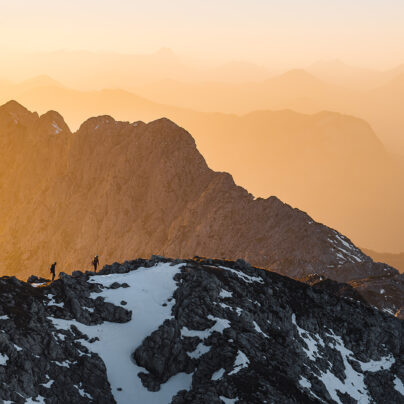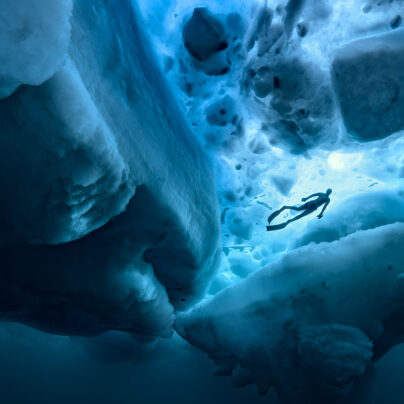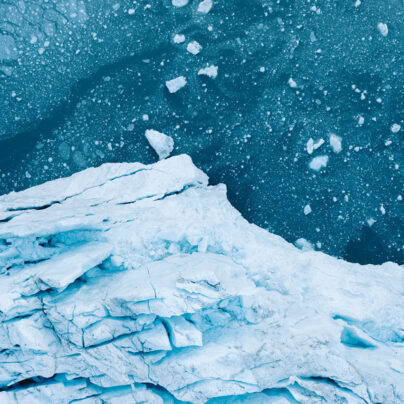Mountains of the Mind
From The Field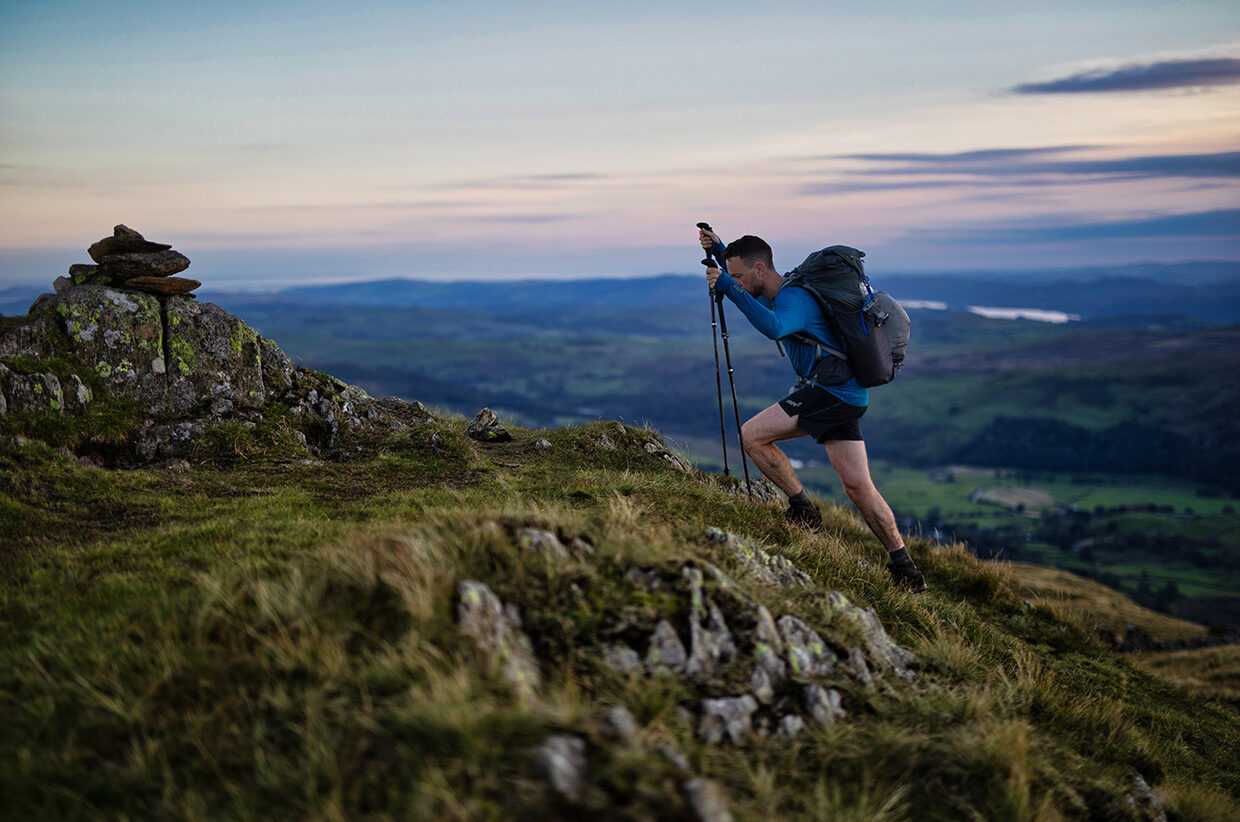
In Conversation with James Forrest
Photography by Dave MacFarlane // inov-8
James Forrest recently set a new record for the fastest self-supported round of the 214 Wainwright fells in the Lake District. He ticked off the peak-bagging list in 14 days and 11 hours, walking 530km and ascending 36,000m. Hiking alone with no support crew or prearranged help, James took a purist approach to his adventure – wild camping in the mountains, cooking his own camp meals, and carrying everything he needed on his back. We chat to him about his journey, the physical and mental battles he faced, and what the future holds.
Sidetracked: Tell us about your love for hiking and the mountains.
James: When I was a boy, my grandpa and gran would take me on long walks in the countryside near our home in the outskirts of Birmingham. I saw the green spaces beyond the city limits as a land of endless opportunities: a land where you could jump in puddles, clamber over fallen trees, run through woods, gaze over rolling greenery as far as the eye could see, throw stones into ponds, feed ducks and pat horses, chase your little brother along country paths with reckless abandon, and hike for mile after mile in a haze of childhood happiness. A lifelong passion for hiking was born.
Sadly, for a decade in my 20s, I lost sight of that passion. I got distracted by the societal pressures of mortgages, promotions, money, and relationships – and never seemed to be able to find the time for hiking. But, aged 30, I totally reassessed my life choices and rebuilt my world. I moved to the Lake District, started working as a freelance writer, and became a peak-bagging addict. Over the next three years I climbed 1,001 mountains across the UK: the 446 Nuttalls in England and Wales, the 273 Vandeleur-Lynams in Ireland and Northern Ireland, and all 282 Munros in Scotland. It was a journey that rekindled my love for the outdoors and solidified my determination to live as adventurous a life as possible.
What inspired you to take on a single, non-stop round of the Wainwrights?
After my three-year, 1,001-mountain mission – which was my obsession from 2017 to 2019 – I decided to calm down in 2020. I wanted to travel and take on lots of little adventures. Lockdown put paid to those plans, however, and the year quickly morphed into something far lazier and more limited than I’d envisioned. I felt hemmed in and frustrated, struck down by wanderlust and itchy feet yet again. So I decided to plan another grand adventure for post lockdown.
Inspired by the incredible feats of endurance from ultrarunners like Steve Birkinshaw, Sabrina Verjee, and Paul Tierney, who’ve all run the Wainwrights in under a week, I wanted to go on a similar journey. A non-stop, single round of all 214 Wainwright fells struck me as the ultimate Lake District adventure; my chance to explore every hidden corner of this majestic national park. And, unlike the runners who have big support crews for their attempts, I wanted to take on the challenge alone and unaided. It was a scary yet exciting prospect, as well as my chance to set a record. Lake District brand inov-8 believed in my idea and agreed to sponsor it. That gave me the conviction to take the leap of faith and make it happen.
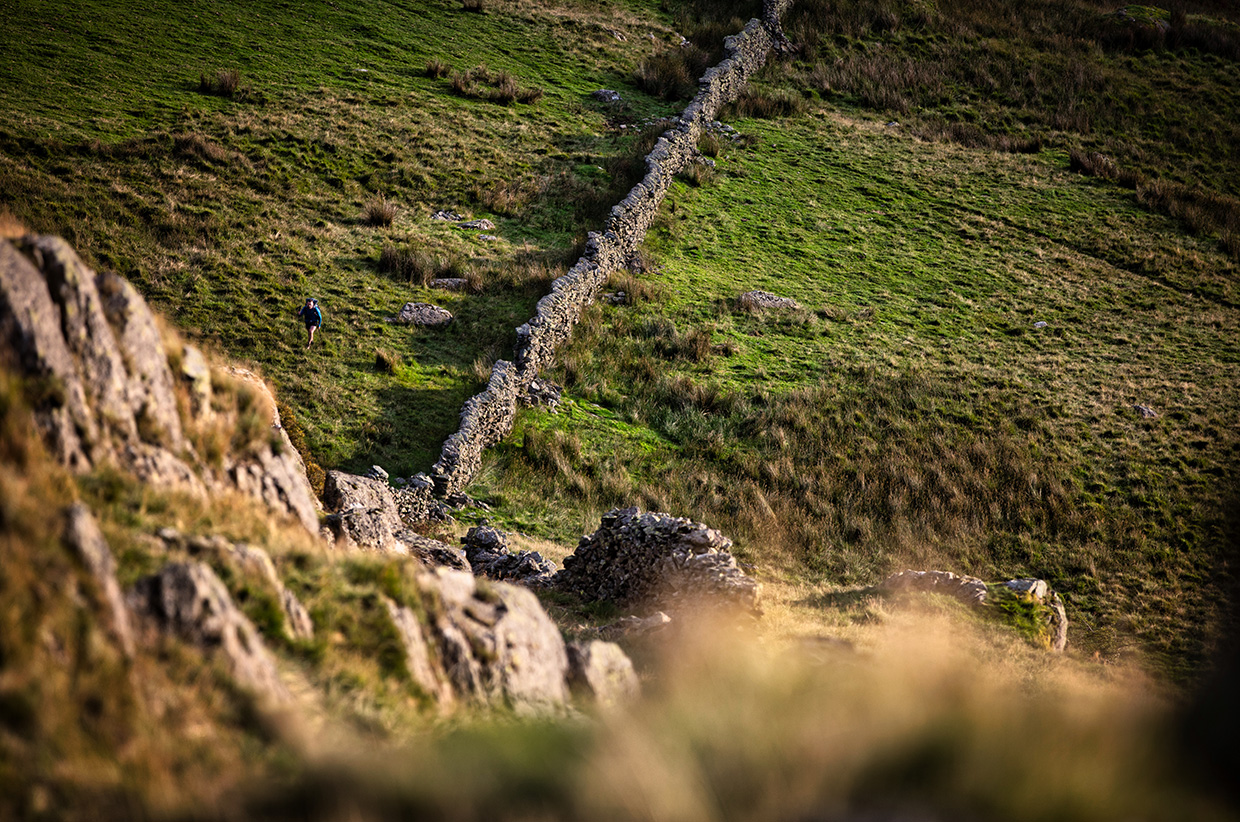
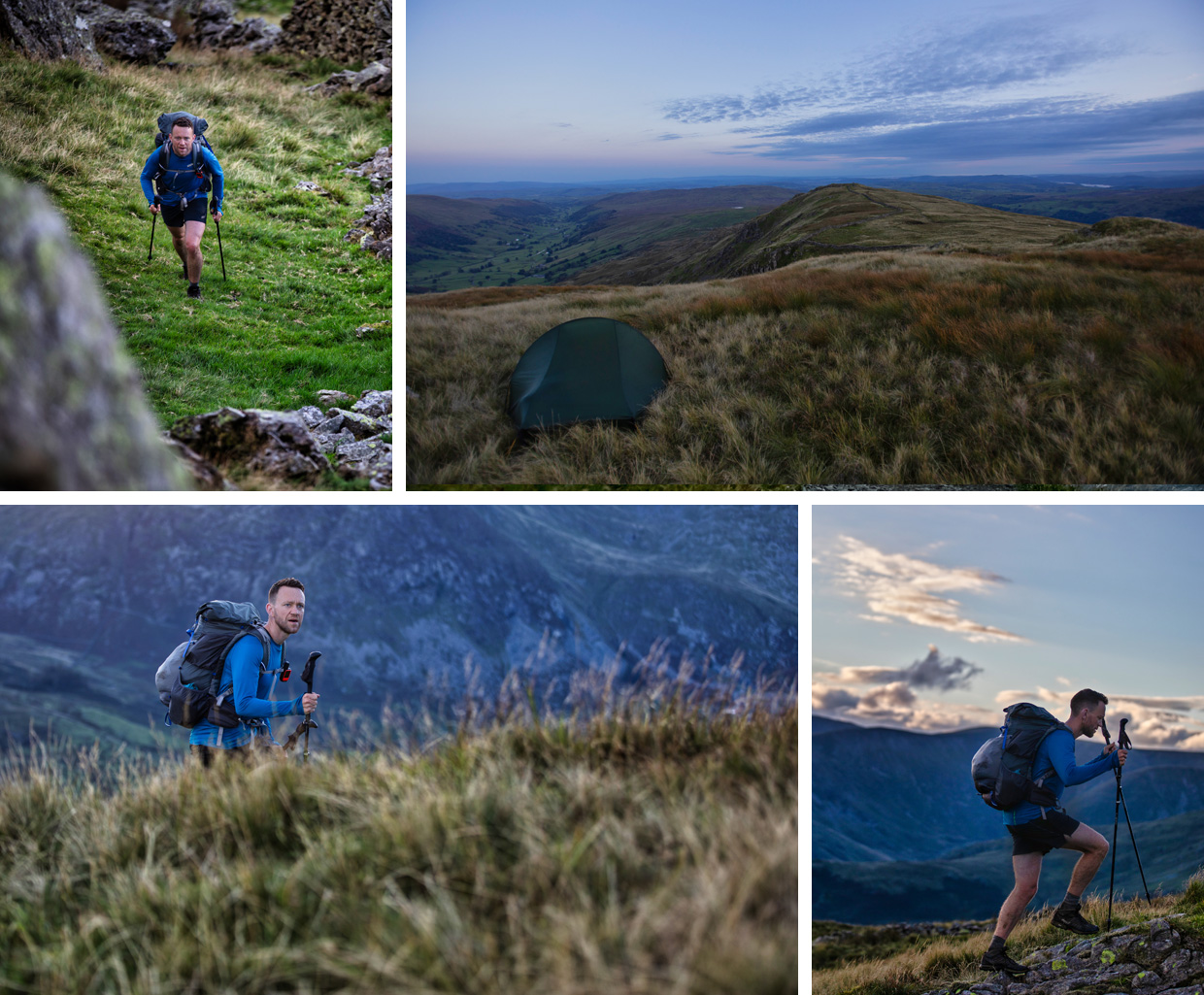
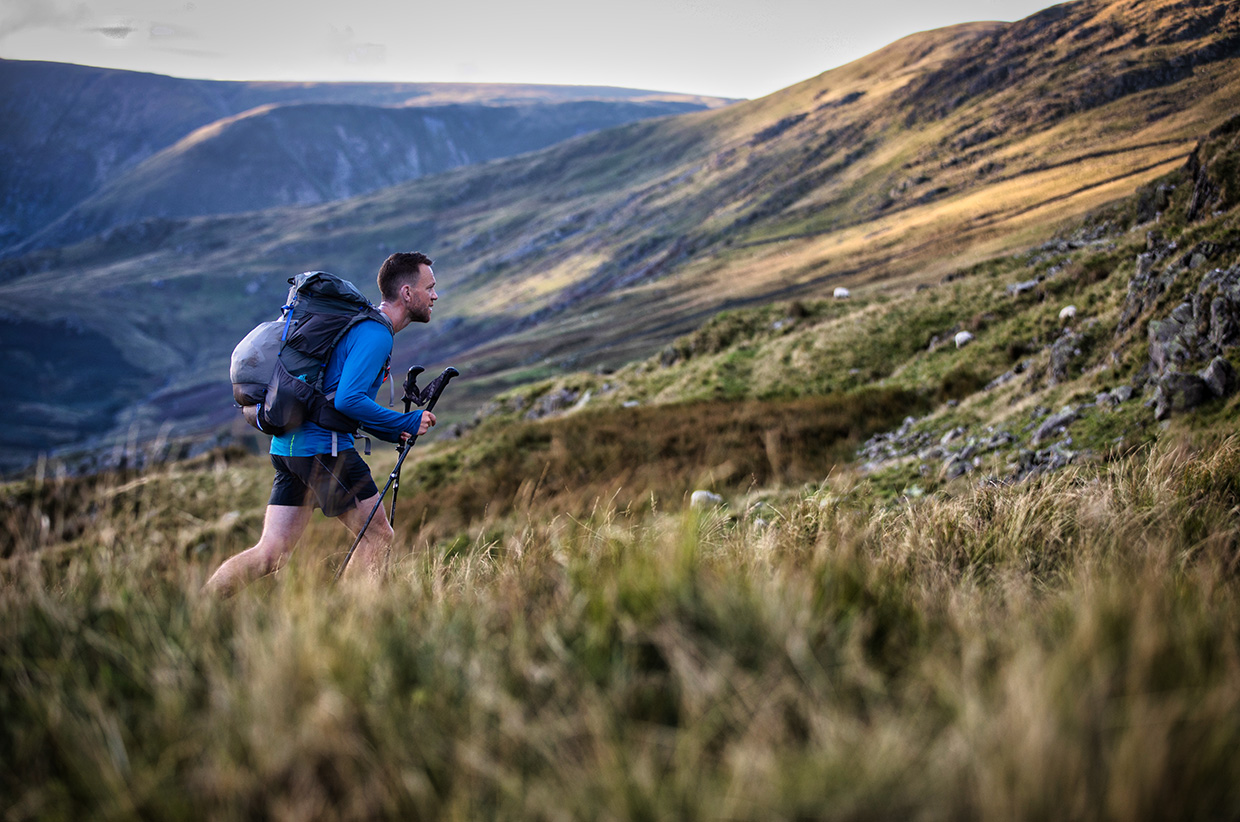
Your adventure was entirely self-supported – did you enjoy that approach?
My aim was to be as self-reliant and self-sufficient as authentically possible. I did this by walking alone, wild camping and bivvying for 14 consecutive nights, cooking my own food every night (no pubs, restaurants or cafés), and resupplying exclusively via stash boxes I’d distributed in advance, rather than going to shops or supermarkets.
I relished the challenge of being self-reliant. Feeling vulnerable and facing adversity on my own, but still getting through it, was life-affirming, while the thru-hiking style gave me a sense of escapism and freedom. But there were downsides. Mentally it was tough. When I was low, I didn’t have any teammates to lift me out of the mental mire, no friendly faces to perk me up with a joke or smile when I needed it most, and no mentor to motivate or inspire me to keep pressing on.
Due to a staycation boom, the UK’s national parks have been plagued by problems of litter, ‘fly camping’, and overcrowding this summer – what was your experience?
My experience was 95 per cent positive. I think the crowds have been flocking to honeypot areas, such as Windermere or Ullswater, and popular peaks like Helvellyn and Scafell Pike. I generally felt a real sense of solitude in the fells. I often hiked for hours without seeing a single person, and several of my wild camps felt very remote. I was struck by the fact that, even during one of the busiest summers in decades, you could quite easily still find isolation and tranquility in the Lake District.
But I’d be lying if I said I hadn’t witnessed negative things. One moment springs to mind: a group of people camping in a National Trust woodland with a huge fire lit, massive six-man tent pitched very unsubtly, beers being swilled, and litter strewn across the ground. It was an example of so-called ‘fly camping’ – irresponsible camping, often at low levels, that doesn’t adhere to the principle of leave no trace. That saddened me. I’m a huge advocate for wild camping, but it should always be done ethically: pitch up late, leave early, carry out all litter, never make fires and, of course, leave no trace. If everyone followed these rules, it’d help keep the Lake District the special place it is.
How did you cope with the harsh Cumbrian weather you encountered?
The atrocious conditions transformed my journey into a gruelling and traumatic experience. I’ve never felt so deeply low and unhappy on a mountain before. I thought the torrential rain and strong winds would never stop – and on more than one occasion I was close to the brink, staring into the abyss of failure, and ready to throw in the towel. The weather preyed on my insecurities. It blinded me with self-doubt, paralysed me with negative thinking, and tortured me with tantalising thoughts of how easy it’d be to give up. But I’m so happy that I found the strength to keep going and make it to the finish line.
There’s no easy way to deal with miserable weather. Over time it chips away at your resolve and erodes your spirit. My main coping strategy was to stay philosophical and simply accept it for what it was. I couldn’t control the weather, so what was the point of getting annoyed? That was just the theory, however. In practice I found myself getting irate and frustrated, but I tried to channel that anger into something positive – a bit like a riled footballer who plays better when he’s angry – and used it to fuel my fire to walk faster.
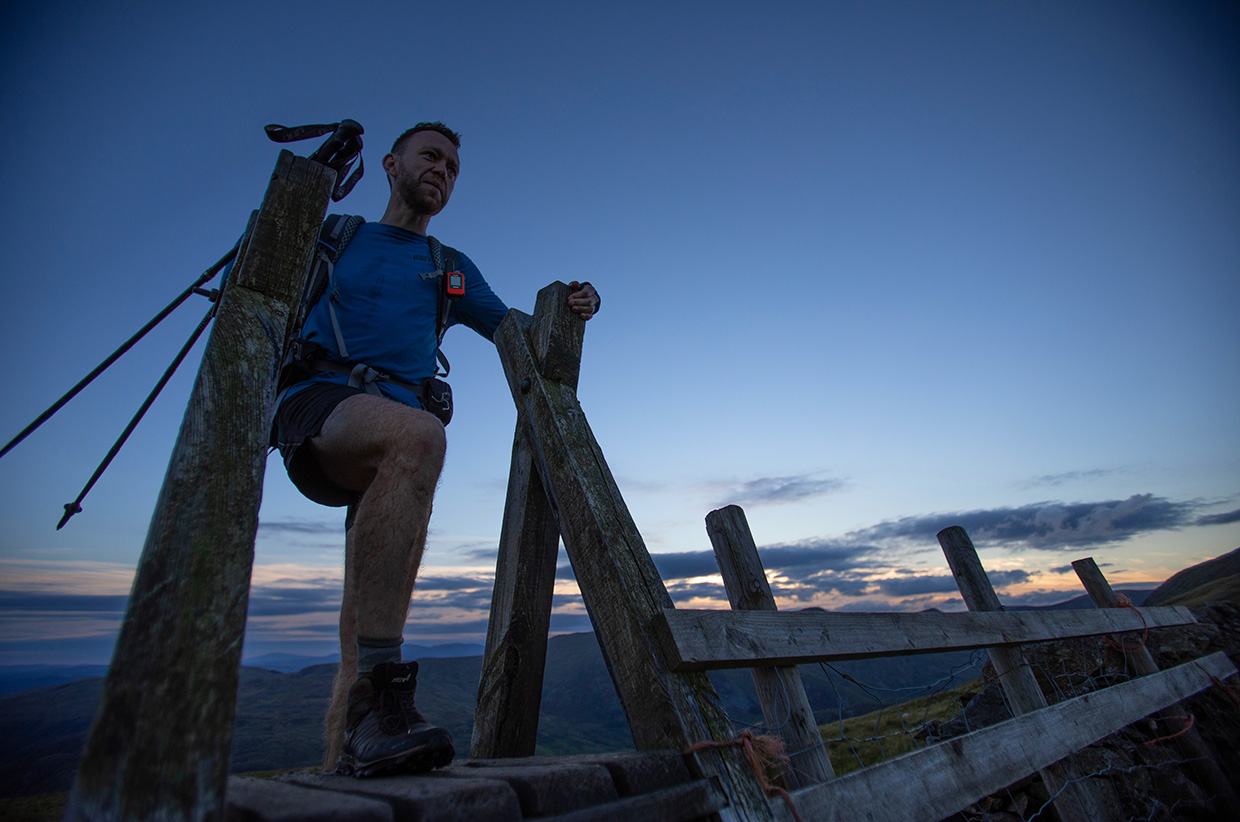
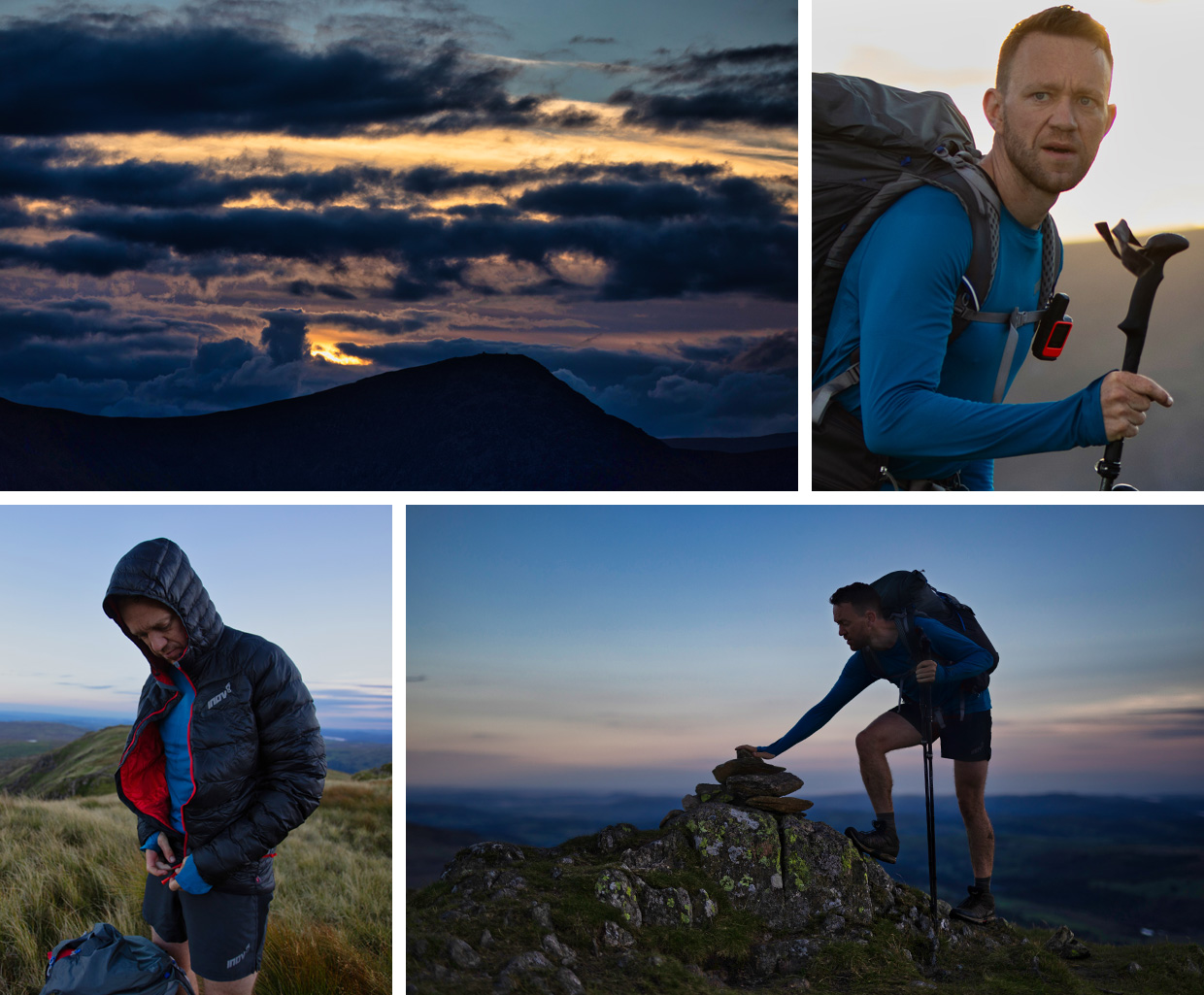
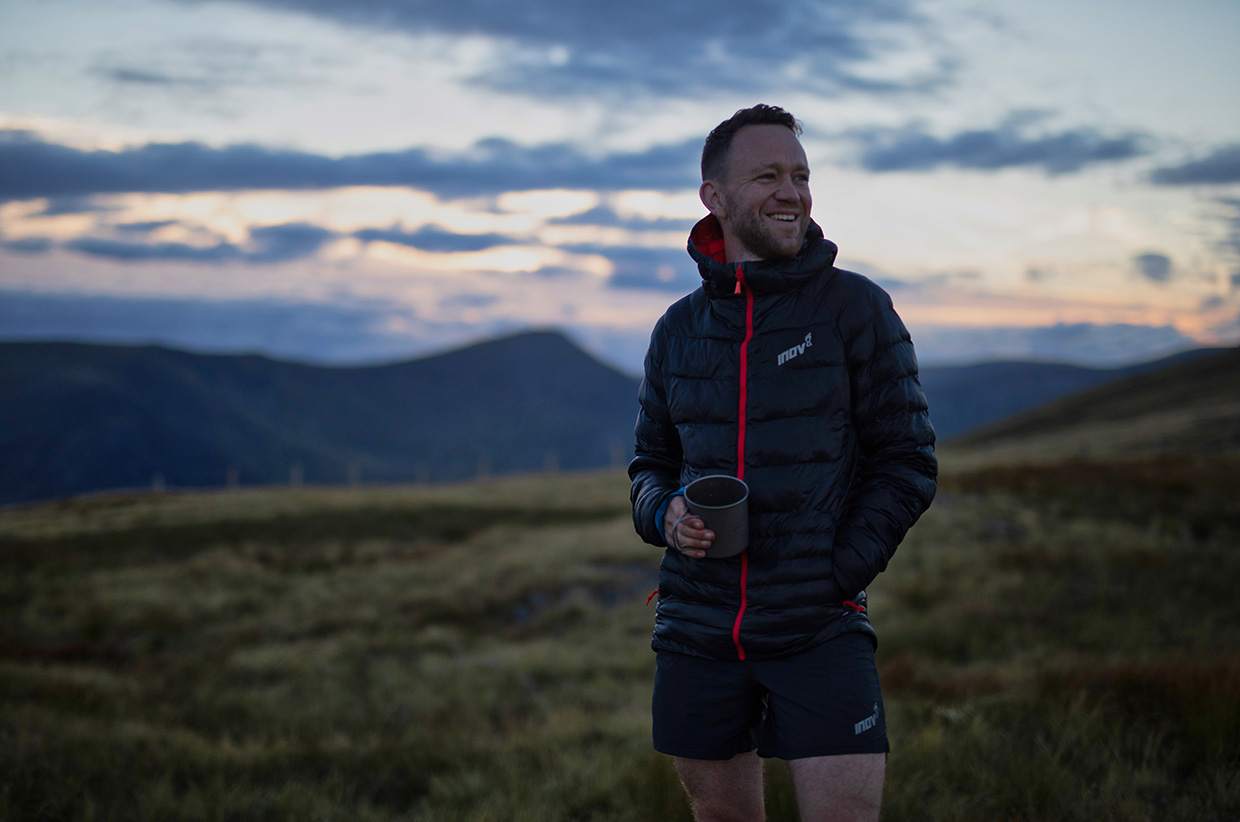
Were there any highs, or was it all lows?
I did enjoy four joyously sunny days, and on those days the challenge was everything I wanted it to be. I loved the exercise, the fresh air, the freedom of the open trail, the challenge of going outside my comfort zone, the majesty of the mountains, and the deeper, more intimate connection I felt with landscape and nature.
My favourite moment was on Holme Fell. I sat in the porch of my tent, tucking in to a hearty expedition meal (supplied by Base Camp Food) and watching the sky morph into ever-changing, blending hues of pink, orange, and red above the jagged profile of the Langdale Pikes. After a few days of awful weather, it was a moment that revived my determination to see the challenge through to the end.
What lessons, if any, have you taken from this challenge?
Not to head into the mountains in bad weather. If nothing else, my Wainwrights journey certainly reminded me that the mountains are in charge. They are to be respected, and only taken on with humility – and as much as they can be therapeutic, they can also be inhospitable places of pain and anguish.
But I don’t want to leave it at that. At the risk of sounding sentimental, perhaps my adventure taught me another valuable lesson: that resilience, positivity, and determination can overcome great obstacles. The lure of the mountains is – at least in part – that they are symbolic of life itself. The gnarly weather, rough terrain, and brutal ascents represent the difficulties we all encounter in life; the summit signifies the goals and aims and ambitions we set for ourselves. So, hopefully, if I could overcome my demons and battle through the hardships, perhaps I can do the same when everyday life throws me a curveball too.
How did it feel to reach the finish line and claim a record?
A wave of emotions swept over me: relief, elation, gratitude, excitement, joy, inspiration, determination, and hope. I had a lump in my throat. I’d actually done it. It was a special moment that will stay with me forever. But, rather than deep and meaningful feelings, my overarching memory is simply of being utterly obsessed with ordering a takeaway pizza and getting home as fast as possible for a hot shower.
What motivates you in hiking and beyond, and do you have any new plans on the horizon?
I’m still reeling from that last adventure, so I need to take a few months to let it sink in, process things, and decide how I want to move forward. I might step away from big, gruelling challenges; I might not. But, whatever I choose, I know that hiking will remain a big part of my life. I want to climb more of Britain’s stunning mountains, I want to progress my career as an outdoor writer, and – perhaps most importantly – I want to continue championing the mental health benefits of spending time outdoors.
For more of James’s adventures, visit jamesmforrest.co.uk, find him on Instagram @jamesmichaelforrest, or read his award-winning debut book Mountain Man: 446 Mountains. Six Months. One record-breaking adventure, published by Bloomsbury.
Photography by Dave MacFarlane.
